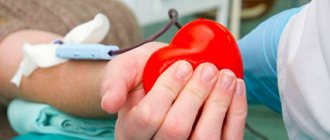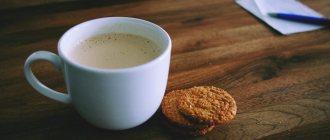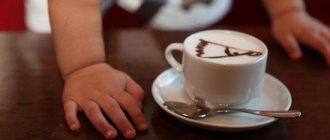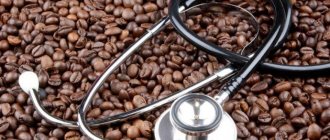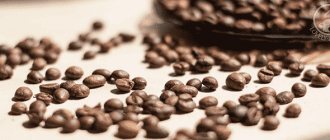Is it possible or not to treat yourself to a cup of coffee at night? An issue that causes constant controversy. Some say that after drinking a strong drink they suffer from insomnia. Others call it the best sleeping pill. For many people, drinking coffee in the evening gives them a boost of energy, and for others it helps them relax. Who is right in their statements? And should you drink coffee before bed?
Caffeine and sleep at night are consequences of pleasure
Coffee is loved for its taste, aroma, and warming effect. But the main feature of the drink is caffeine. It is he:
- activates brain activity;
- helps improve performance;
- relieves fatigue;
- gives strength.
Being an effective psychostimulant, caffeine helps prolong hours of wakefulness at night, devote time to work, study, and delay sleep. This effect of the component will be on 90% - 97% of people. The remaining 3%-10% can answer the question of what will happen if you drink coffee at night - nothing. Their bodies simply do not react to caffeine.
Everyone else who decides to allow themselves to drink a cup of strong coffee a few hours before bed should anticipate the consequences - bad mood and loss of energy in the morning, frequent awakenings, restless sleep and even nightmares.
How does insomnia affect the body?
Sleep plays a big role in a person's life. It is during sleep that the process of restoration of all body functions and rejuvenation of the body occurs. Adults need at least seven hours of rest to rest. And for some, nine hours of daily sleep is not enough to renew their strength.
If you do not sleep for the required amount of time, the immune system will suffer first. In addition, a number of other problems may appear:
- mental disorders of various etiologies;
- stressful conditions, depression;
- hypertension, diabetes, hormonal disorders;
- obesity or vice versa - anorexia.
There are many reasons for insomnia, one of the most common is excessive coffee consumption at night.
Moderate consumption of the aromatic drink (about three cups per day) only benefits the body. Insomnia does not threaten those who do not abuse espresso.
International research - about the results
Reactions to caffeine and the effect of coffee on sleep have been the subject of numerous studies by scientists around the world. What results were achieved in different countries?
America. For a long time, state scientists have been unable to find answers to questions about why caffeine has such an effect on people if they drink coffee at night. They conducted many experiments, involving five volunteers from the state of Colorado in the process.
As part of the research, people lived for two months in a special laboratory, where they drank a cup of strong espresso every day before going to bed. As a result, it was found that this dose of caffeine reduces the production of the hormone melatonin by 40 minutes. It is this hormone that is responsible for a person’s healthy, restorative sleep. In other words, the drink slows down a person’s biological clock for a specified time, which is why you should not drink it at night.
What are the signs that indicate that coffee interferes with sleep?
After drinking coffee for a long time, it is difficult to give up your favorite drink if you have problems sleeping. Still, you need to listen to your body and start taking care of your health. The following reasons may be a good reason to avoid drinking strong drinks at night.
- In the evening you feel tired, but you can’t fall asleep for a long time.
- Sleeping pills take pride of place in the first aid kit; without it you cannot plunge into the kingdom of Morpheus.
- The sleep is shallow, you wake up more than three times during the night, and you feel tired in the morning.
All of these signs are a reason to change the dosage of caffeine consumption to a lesser extent. Try drinking strong espresso only in the morning. It is advisable to give up coffee in the afternoon. The drink has many beneficial properties, but when it comes to health, it is necessary to adjust the norms of its consumption so as not to aggravate the situation.
Coffee is harmful for older people who have problems with the heart and blood vessels.
Why shouldn't you drink coffee at night? Despite the fact that some lovers claim that it is completely harmless, there is definitely no benefit from espresso in the evening. Caffeine affects the body from two to seven hours, and much depends on the characteristics of the person. During the first two hours, the effect is clearly expressed on all body systems. In the subsequent period, the impact will be felt, but not as strong. Some will not be able to sleep through the night due to health problems. And for a healthy person, after a cup of espresso, sleep will come only after 1-2 hours.
Coffee at night: medical opinion
Most doctors agree that you should not drink coffee before bed. Even in moderate quantities, it excites the nervous system, impairs sleep quality and provokes insomnia. To find out why you shouldn’t drink coffee at night, scientists from different countries are conducting independent studies.
American experts came to interesting conclusions based on the results of a scientific experiment. The study involved 5 volunteers who drank a cup of espresso coffee every night before bed for 2 months. As a result, it was found that consuming oriental delicacies directly affects hormonal levels. The production of melatonin in the subjects occurred with a 40-minute delay. This effect prevents a person from falling asleep peacefully and regaining his strength.
Similar scientific studies were carried out in Japan. Young people from among students were recruited to participate in the experiment. One group of volunteers drank a cup of coffee and immediately went to bed for a couple of tens of minutes. Upon awakening, the subjects noted a surge of strength, attention, vigor and excellent mood.
Such results led scientists to the conclusion that caffeine does not act on the body immediately, but only after 20 minutes. After this time, the production of the hormone adenosine, which is so important for healthy sleep, begins to be blocked. Therefore, in some cases (for example, when changing time zones), coffee helps to quickly relax and invigorate. But doctors categorically do not recommend constant consumption of the drink in the evening.
Why does coffee prevent you from falling asleep?
Why is it not recommended to drink coffee before bed? Firstly, because of the surge of energy and vigor, which is inappropriate at night. Secondly, due to irritation of the nervous system: at night it must deactivate and reboot. Thirdly, due to its diuretic properties: frequent urge to urinate will not help you fall asleep quickly.
For these reasons, drinking coffee before bed is not recommended, especially at night. And if you decide to sleep during the day, the dose of caffeine will also prevent you from relaxing and taking a good nap.
The effect of coffee on human biorhythms
Once in the stomach, caffeine does not begin to act immediately, but after 20 minutes. The Japanese even found that those who drink a cup of coffee during the day and immediately go to bed before the effects of caffeine appear, wake up refreshed after 20 minutes and remain energetic for the rest of the day.
The same thing happens in the evening. Caffeine suppresses the production of the hormone melatonin, which promotes the transition to deep sleep. Even if a person manages to fall asleep, it is a quick sleep; after 20 minutes it is interrupted, and so on several times a night. That is, because of drinking a cup of coffee too late, you may either not fall asleep at all, or spend the whole night on the verge of sleep and wakefulness.
The degree of impact of caffeine on the human body varies from person to person. According to scientists, in 3-10% of people, the nervous system does not react to caffeine at all; they are able to sleep regardless of the time they drink coffee. Others feel the effect of the alkaloid for 2–7 hours.
This is the reason for the well-known recommendation not to drink coffee after 18 hours (at least during the last 4 hours before bedtime). The authors of medical articles simply provide average data. In fact, a cup of coffee will not harm some people, even if they drink it 2 hours before bedtime; for others, it is better not to drink the drink after 15 hours.
Those who drink coffee in the evening in order to overcome drowsiness and work should take into account that caffeine shifts biorhythms by about 40 minutes.
If you don’t sleep the same 40 minutes longer in the morning, you will feel weak all day and unable to concentrate. Continuing to suppress drowsiness with the help of coffee, a person risks that temporary malaise will develop into the scourge of office workers - chronic fatigue syndrome.
What do doctors think about night coffee?
To get an answer to the question of whether it is possible to drink coffee at night, medical professionals study the effect of caffeine on the body, including taking into account the time of day chosen for consumption. It is caffeine that is responsible for the feeling of alertness and reducing drowsiness in people. It’s just that it manifests itself differently in each individual case.
Much depends on the body’s reaction to the pathogen, as well as:
- on the method of brewing the drink;
- his fortresses;
- varieties;
- roasting method.
If a small cup of espresso is enough for one person to cheer up, then another with the habit of drinking coffee often and in large quantities to raise the tone will need to drink several such cups to achieve the desired effect.
Doctors say that even in small quantities, caffeine entering the body before bedtime has a stimulating effect and irritates the nervous system.
The quality of rest after a portion of an invigorating drink will be an order of magnitude lower than without it, sleep will become superficial, and you will not be able to fully restore your strength by the morning.
Experts strongly recommend limiting yourself to coffee starting at 6 pm. This time, in their opinion, is critical for testing the body with caffeine.
The exception is people so-called “night owls” with shifted biorhythms. They can afford to drink a cup of aromatic coffee in the evening no later than 20 o'clock, 4 hours before bedtime. Only in this case will the nervous system have time to prepare for a night's rest, and sleep will be sound and restorative.
Questions about whether drinking coffee at night is harmful are answered only positively and it is strongly recommended to try to drink a less strong drink, reducing the level of caffeine entering the body before bed.
How to fall asleep after drinking coffee at night
When visiting or at parties, sometimes you have to drink coffee in the evening. In such cases, it is better to order not espresso, but a creamy or milkshake: cappuccino, latte, raff. Although these drinks contain no less caffeine than espresso, the concentration is lower, and milk and cream neutralize the effect of the alkaloid.
If you still suffer from insomnia due to an overdose of caffeine, then doctors recommend:
- Walk in the fresh air for 20–30 minutes, stand on the balcony, or at least ventilate the bedroom;
- drink a cup of warm milk with honey;
- drink an infusion of mint, linden blossom, chamomile or raspberry leaves with honey;
- light an aromatic lamp with essential oil of lavender, mint or lemon balm;
- if you don’t like the smell of essential oils, buy a salt lamp and light it before bed;
- turn off the lights, lie on your back, relax. Slowly inhale deeply and exhale just as slowly. Repeat 10–20 times (you can alternate: breathe first with your chest, then with your stomach);
- Inhale the scent of dried valerian deeply 10–20 times. If it is not there, breathe over the tincture. It is not advisable to drink the tincture: it does not go well with coffee;
- turn on an audio recording of the sea tide, the sounds of a waking forest;
- try not to think about problems, mentally count from 1 to 100 and back;
- come up with a sequel to your favorite book or movie.
How to reduce harm and sleep
If you want to drink a caffeinated drink in the evening, you can use methods that neutralize its negative effects:
- Better drink instant coffee, it contains up to 48 milligrams of caffeine. For comparison, in espresso and Americano - up to 68 milligrams, in natural black - up to 65.
- Dairy products soften the effects of caffeine. Add milk and 10-15% low-fat cream to drinks.
- Place a slice of lemon and a teaspoon of honey in a cup. They will work the same way as dairy products.
If you drank caffeinated liquid at night and can't sleep, try the following tips.
Drink a glass of milk heated to 30-40 degrees, add cinnamon and 1-2 teaspoons of honey.
Interesting! How to hold a coffee stick correctly
Milk can be replaced with mint, linden or chamomile infusion.
Try to relax. Think about pleasant events, remember the best moments of your life, read a book in bed.
Light scented candles or sticks, they are calming. Choose the scent of lavender or lemon balm. If you have valerian, breathe in its infusion.
Walk for half an hour in the fresh air. If you live in an apartment, a balcony will do.
Alternative to a coffee drink before bed - what to choose
As a completely safe substitute for the mind-stirring coffee at night, you can choose drinks that are similar in taste and smell and do not interfere with sleep. For example, a good option is all-natural chicory. The drink helps normalize metabolism, helps cleanse the kidneys and even improve the health of people with diabetes. Just like coffee, the drink tones the body for a while, and its consumption will not in any way affect the quality of sleep or state in the morning.
Another worthy analogue and a real source of beauty is barley coffee. The drink contains silicon and lysine, allowing the body to produce more collagen. Its regular use has a positive effect on skin elasticity, helps hair grow strong, thick and shiny.
But the most important thing is that barley coffee drink has a positive effect on the nervous system without stimulating the centers of brain activity. For those who like to drink coffee at night just because of the familiar taste and aroma, the option with a barley plant analogue is simply ideal.
Let us note that drinking strong coffee immediately before bed is not the best solution for those who care about their health and like to wake up in the morning cheerful and rested. You can resort to the drink in exceptional cases, not forgetting how long before bedtime you can drink coffee and in what quantities.
How to fall asleep faster under the influence of caffeine - useful tips
But what to do if you drank coffee at night and need to rest? Neutralize the effect of caffeine or take the advice of experienced coffee lovers who have their own secrets for quickly going to sleep, regardless of the circumstances.
Advice one. You can pamper yourself before bed with a glass of warm milk, honey and cinnamon. Milk soothes, sets the mood for rest and helps to relax - this was known many hundreds of years ago.
Tip two. You need to try to relax. It’s worth forgetting about what the next day promises, how many hours are left before waking up. Thoughts about pleasant things, about the best moments of life will help. A good option is reading your favorite book. This should be done in bed, in dim light.
As soon as you feel sleepy, you can turn off the light and go to bed. An effective option is to close your eyes and imagine beautiful landscapes, try to hear the sounds of nature, smells, while breathing should be deep and relaxed.
Tip three. After coffee at night, the body is overexcited. After calming him down, you can try to fall into a sound, healthy sleep. Calm music, recorded sounds of nature, soft light from a night light or a “starry sky” lamp will help you find balance.
When coffee is good for you
Since the influence of many people’s favorite drink on the quality of sleep is quite varied, scientists continue to conduct various experiments. Let's talk about two of the most interesting:
- In the USA, an experiment was conducted with a group of people who were offered a cup of espresso every time before bed. As a result, it was found that caffeine literally blocks the production of melatonin, a hormone that promotes healthy sleep, for as much as 40 minutes. To put it simply, it knocks down our “biological” clock, slows it down, disrupting the natural course.
In normal situations, this will be a negative point, but for those who are forced to frequently change time zones when flying, coffee will help you quickly adjust to the right time and adapt your body.
- In Japan, as a result of one test, it is known for sure that the invigorating effect of coffee appears only after 20 minutes. Two groups of student subjects were asked to drink a cup of drink, then one of them was sent to a short 20-minute nap. After waking up, they felt a strong surge of energy, unlike the second group that did not rest, and responded better to the proposed tasks.
Benefits of caffeine
The main component of coffee is caffeine. It is he, being a natural stimulant, that provides the body with a boost of vigor. The beneficial properties of the drink include the following:
Stimulation of cardiac activity and nervous system. Coffee beans contain the natural alkaloid caffeine, which increases blood pressure.
- Caffeine prevents the onset of Parkinson's disease. Such conclusions were made by scientists after a series of experiments and observations in which the subjects drank coffee. More often the effect manifested itself in the male half.
- Prevention of type 2 diabetes mellitus. Caffeic and chlorogenic acid, as well as caffeine, suppress the accumulation of amyloid protein, which affects the development of diabetes.
- One of the scientifically unconfirmed facts is the suppression of depression.
- Reducing the risk of developing liver cirrhosis. Coffee contains many substances that science has not yet classified, one of them has a similar property.
- Increased gastric secretion. Thanks to the substances contained in coffee beans, the acidity of gastric juice increases. Very useful for gastritis with low acidity.
- Prevention of cardiovascular diseases and stroke. Under the influence of caffeine, the blood vessels of the brain and heart dilate.
Coffee as a sleeping pill
Coffee can act as a sleep aid in three cases:
- for those who are sensitive to caffeine;
- for experienced coffee drinkers who drink more than 4 cups a day;
- for instant coffee lovers.
If a person is insensitive to the energizing effects of caffeine, this does not mean that the substance causes drowsiness. This is where the unconscious desire to stand out and demonstrate exclusivity comes into play: the drink wakes everyone up, but puts one to sleep. However, no one has canceled the negative effect of the alkaloid on the heart and blood vessels. Therefore, it is better not to abuse coffee.
For those who drink more than 4 cups of coffee daily, the body tries to resist the effects of the alkaloid. The braking mechanism turns on, and after coffee the person wants to sleep. This is a rather dangerous symptom, and the daily dose of the drink should be reduced.
Instant coffee is obtained from natural coffee. But besides caffeine, coffee beans contain another alkaloid – theobromine. It causes vasoconstriction of the kidneys and drowsiness. When drinking a bean drink, caffeine inhibits the effect of theobromine. Only people with kidney disease can feel mild discomfort due to vasoconstriction: a barely noticeable nagging pain that can be easily relieved by drinking a glass of water.
The highest concentration of caffeine in the bean is near the outer shell; the closer to the center, the more theobromine. When making some brands of instant coffee, the top layer is removed from the beans. As a result, the balance of caffeine and theobromine in the drink is disrupted, and coffee begins to act as a sleeping pill.
If instant coffee makes you drowsy, it makes sense to choose a different brand or opt for a drink made from natural ground beans.
Effect of theobromine on sleep
The composition of coffee beans has not been fully studied. Everyone knows that the main active ingredient is caffeine. Few people have heard of theobromine. This component is also present in grains. The substance is a white powder with a bitter taste.
This powder is widely used in medicine. It is useful for the treatment of colds of the bronchi and lungs. Another component is added to toothpaste to improve the condition of the enamel. Scientists have found that theobromine has properties similar to caffeine. In particular, the substance enhances the work of the heart muscle and has a diuretic effect.
In large quantities, the powder can cause poisoning. But when drinking coffee, chocolate, cocoa, it is impossible to reach the limit to cause intoxication. An adult needs to reach a concentration of 1000 mg per kilogram of live weight. Which means, if an individual weighs 60 kilograms, then he needs to eat at least 25 kilograms of chocolate.
Theobromine is also found in foods such as nuts and Coca-Cola. It has a hypnotic effect on the body. Thanks to this substance, many coffee lovers feel a calming effect. Let's find out more reasons why coffee makes you sleepy.
- As mentioned above, theobromine in coffee is the root cause of the relaxing effect. Many manufacturers, when processing coffee beans, extremely thin the protective shell. This is where caffeine is found. The core remains, where theobromine is located.
- If you have health problems, if there are disturbances in the functioning of the adrenal glands, then after coffee you want to sleep.
- When overdosing on espresso, coffee connoisseurs who are already accustomed to caffeine experience a hypnotic effect.
- Diseases of the liver, pancreas, and the presence of the Epstein-Barr virus have the opposite effect from coffee.
It is for these reasons that doctors do not recommend drivers to drink espresso before a long journey. There is a risk of falling asleep while driving.
If you want to achieve not the soporific effect of espresso, but a surge of vigor, then choose robusta beans for the drink, it contains more caffeine.
How to minimize harm
If a person suffers from hypertension, but still wants to enjoy a hot drink, he can choose a caffeine-free drink. However, you should not get carried away with such a drink either. Not only does caffeine negatively affect the human body, but also a large number of unstudied substances have harmful effects. For almost any disease, you can find a way to drink your favorite drink if you follow some rules:
If a person suffers from diabetes, he can afford to drink no more than 1-2 cups of drink per day. It is advisable not to add sugar.
Sugar is also contraindicated in obesity.
- It is advisable for people suffering from insomnia not to drink an invigorating drink at night.
- If you have gastritis, you should avoid drinking the drink on an empty stomach. A combination of coffee and milk can be beneficial.
- During pregnancy, it is advisable to reduce consumption to a minimum or avoid it altogether.
- If you have heart disease, it is undesirable to drink instant coffee, as it increases cholesterol levels. It is advisable to drink natural coffee from machines with paper filters.
- The main rule is to drink bean coffee, not instant coffee. The drink is made from whole grains and is free from various additives used in production. By choosing packaging with the inscription “ECO”, you can be sure that the entire path taken by the grain from the plantation to the consumer’s mug was environmentally friendly.
Who shouldn't drink coffee in the evening?
Studying the effect of coffee on sleep, scientists came to the conclusion that early risers have a nervous system that is more vulnerable to the effects of caffeine than night owls. “Larks” more often suffer from insomnia after drinking coffee at the wrong time, “night owls” are less sensitive to caffeine and are more likely to enter the deep sleep phase.
But this applies only to absolutely healthy people. The problem is that coffee causes heart palpitations, increases blood pressure and blood sugar levels, and has a diuretic effect. The most pronounced “night owl” will not fall asleep if the heart beats too quickly, the pressure goes off scale, and the bladder periodically reminds itself.
As a rule, problems with the cardiovascular system begin after 35–40 years of age (although for some, earlier). Therefore, even those who in their youth drank coffee without problems at any time of the day or night should stop drinking the drink in the evening as they age.
Sleepless night effect
So if you spend a “night with coffee” (especially instant coffee), then there will be nothing fatal about it. However, it is worth remembering that this can affect your psychological and emotional state: aggression, irritability will increase, and excitability will also increase.
Death from a caffeine overdose is theoretically possible. Toxicologists estimate that a cup of espresso can be fatal if consumed within half an hour, based on a ratio of 1 cup per kilogram of body weight. That is, an ordinary person needs to drink 60-70 cups within 30 minutes.

